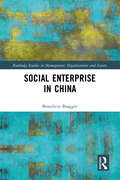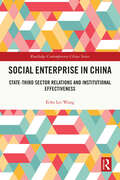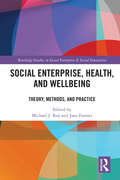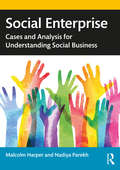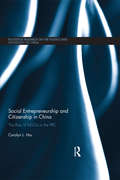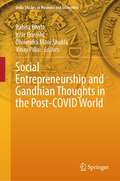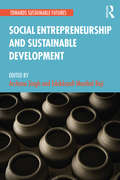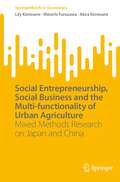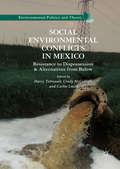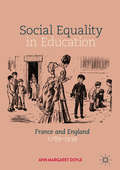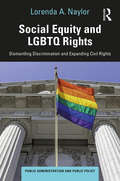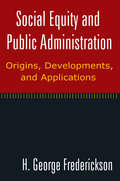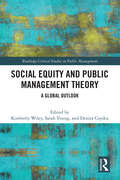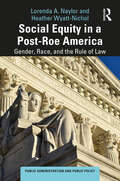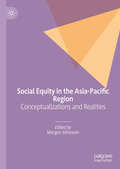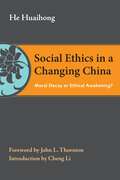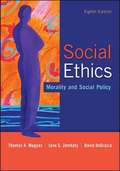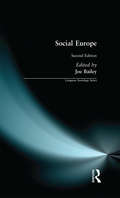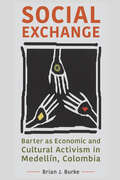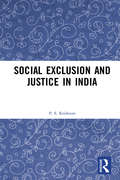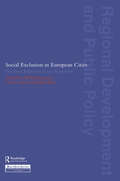- Table View
- List View
Social Enterprise in China (Routledge Studies in Management, Organizations and Society)
by Benedicte BrøggerThis book explores social innovation and entrepreneurship in China. Focusing on selected social enterprises and processes, it addresses the question of "why China?", not in terms of military, economic or political ambitions, but in the terms of social innovation and welfare policies. The analyses range from detailed ethnography to discussions of broad global trends. Despite vastly improved social conditions in the country, there are still unresolved issues that social enterprises address. The study elaborates on the complexities involved in their positioning between the state and their beneficiaries. Adding to the complexity is China’s dual system of circulation and the moral economy of ethnic minorities. The theoretical foundation of the study is the Durkheimian concept of the social contract. Its content is viewed as comprised of Maussian total social facts or guanxi, a similar Chinese framing, operationalised to particular socio-cultural configurations. The empirical cases document how social enterprises reposition elements in the various configurations in order to mobilise resources from their stakeholders. The book concludes that the discursive topology is altered in the process and the social contract is renewed in culturally meaningful, if paradoxical, ways. This book will be of interest to researchers, students and academics in the fields of business and social entrepreneurship, especially to those with a particular interest in the Chinese case.
Social Enterprise in China: State-Third Sector Relations and Institutional Effectiveness (Routledge Contemporary China Series)
by Echo Lei WangWang offers an empirically based exploration into work-integration social enterprises as a means for delivering social services in China. Focusing on the political economy of social enterprise development in China, Wang examines the nature of the relationship between the state and social enterprises and the implications of such relationships for their institutional effectiveness. She adopts a bottom-up approach that investigates indigenous practices embedded within the local political context. Common ground has been established internationally that the social enterprise model provides new ways of social service delivery that could potentially change and restructure the social welfare economy. However, the development path differs across social contexts, especially in an authoritarian country like China. This study provides insights into China's efforts to develop its social welfare sector and reinvigorate customary ideas about how public services could be better offered given the country's political economy. This book will be of great interest to both scholars of China’s political economy and those with an interest in the development of the social enterprise sector looking to see how this works in a Chinese context.
Social Enterprise, Health, and Wellbeing: Theory, Methods, and Practice (Routledge Studies in Social Enterprise & Social Innovation)
by Michael J. Roy Jane FarmerIn recent decades, governments have promoted social enterprise as a means to address welfare and tackle disadvantage. Early academic work on social enterprises reflected this development and engaged with their ability to deliver and create jobs, work towards remedial environmental goals, and address a range of societal challenges. More recently, researchers have started to investigate the broader potential of social enterprise for the wellbeing of people and the planet. In this context, this book aims to answer the question: In what ways can social enterprises improve the health and wellbeing of individuals and communities? The chapters in this edited collection take different perspectives on assessing how social enterprises address disadvantage and deliver health and wellbeing impacts. Drawing on evidence from international research studies, Social Enterprise, Health, and Wellbeing: Theory, Methods, and Practice presents the ‘first wave’ of innovative research on this topic and provides a platform of evidence to inspire the next generation of scholarly and policy interest. Drawing on the cutting edge of interdisciplinary research in the field, this book will be of interest to researchers, academics, policymakers, and students in the fields of entrepreneurship, public and social policy, community development, public health, human geography, and urban planning.
Social Enterprise, Health, and Wellbeing: Theory, Methods, and Practice (Routledge Studies in Social Enterprise & Social Innovation)
by Michael Roy Jane FarmerIn recent decades, governments have promoted social enterprise as a means to address welfare and tackle disadvantage. Early academic work on social enterprises reflected this development and engaged with their ability to deliver and create jobs, work towards remedial environmental goals, and address a range of societal challenges. More recently, researchers have started to investigate the broader potential of social enterprise for the wellbeing of people and the planet.In this context, this book aims to answer the question: In what ways can social enterprises improve the health and wellbeing of individuals and communities? The chapters in this edited collection take different perspectives on assessing how social enterprises address disadvantage and deliver health and wellbeing impacts. Drawing on evidence from international research studies, Social Enterprise, Health, and Wellbeing: Theory, Methods, and Practice presents the ‘first wave’ of innovative research on this topic and provides a platform of evidence to inspire the next generation of scholarly and policy interest. Drawing on the cutting edge of interdisciplinary research in the field, this book will be of interest to researchers, academics, policymakers, and students in the fields of entrepreneurship, public and social policy, community development, public health, human geography, and urban planning.
Social Enterprise: Cases and Analysis for Understanding Social Business
by Malcolm Harper Nadiya ParekhThis book introduces students and others to the discipline of social entrepreneurship, which encourages the creation of enterprises that are socially inclusive yet economically and ecologically sustainable. In each chapter there is a mix of case studies about internationally well-known enterprises and other more local enterprises which are totally new. The book leads its readers to understand and appreciate entrepreneurial issues and to engage themselves in community-based activities. Social Enterprise helps readers to: analyze and articulate the blend of social, environmental and economic values which is present in all kinds of enterprise understand the issues involved in translating good intentions with multiple goals into focused, sustainable and practical actions propose alternative social enterprise management strategies based on their own analysis of case studies of entrepreneurial endeavors that are perceived to be ‘social’ The authors take a pragmatic yet critical approach, and this book should be core or recommended reading for Social Entrepreneurship and Social Enterprise modules at advanced undergraduate, postgraduate and MBA levels.
Social Entrepreneurship and Citizenship in China: The rise of NGOs in the PRC (Routledge Research on the Politics and Sociology of China)
by Carolyn L. HsuOver the last thirty years, social entrepreneurship has boomed in the People’s Republic of China. Today there are hundreds of thousands of legally registered NGOs, and millions more unregistered, working in the areas of the environment, education, women’s issues, disability services, community development, LGBTQ rights, and healthcare. The rise of these Chinese NGOs and their implications for civil society merits the focus of significant scholarly attention. This book draws upon the personal stories of social entrepreneurs in China, as well as their supporters and beneficiaries, in order to examine what the rapid growth of social entrepreneurship reveals about China's complex and dynamic society in the 21st century. It discusses the historical, cultural, and political circumstances that allowed and inspired people to become social entrepreneurs and create new forms of democratic engagement. Examining what social entrepreneurship with Chinese characteristics looks like, the book explores how it is changing the relationship between Chinese citizens and the state, and goes on to explain the subsequent effect on Chinese society. Highlighting the importance of citizen activism in the PRC from an interdisciplinary perspective, this book will be of interest to students and scholars of Chinese Studies, Chinese Politics, Civil Society and Sociology.
Social Entrepreneurship and Gandhian Thoughts in the Post-COVID World (India Studies in Business and Economics)
by Israr Qureshi Babita Bhatt Dhirendra Mani Shukla Vinay PillaiIn this edited book, we provide foundational tenets of Gandhian perspective, and present examples of social organizations that are aiming to insulate themselves by adopting community and village-centered approaches to restructuring socially-embedded economic activities that align with Gandhian principles. These cases highlight the relevance of Gandhi's thoughts in the field of social entrepreneurship. We examine key principles such as Sarvodaya (the welfare of all), Antodaya (the upliftment of the weakest), self-sufficiency, self-reliance, Nai Talim (holistic education), and Trusteeship. We explore how social organizations implement these principles to promote resilience and well-being at the community level. The COVID-19 pandemic revealed unsustainable practices in the world, including disrupted supply chains, contagious effects of integrated global economy that ignore the local self-reliance, and unsustainable internal displacement that make cities dependent on rural labor and rural population dependent on urban areas for jobs. These issues show that there are systemic problems with how our society and market are structured. The traditional way of development that focuses on profit maximization and unlimited wants has caused problems like inequality, resource depletion, and disproportionate wealth accumulation. Unlimited growth in a limited world has led us to social, economic, and ecological crises. However, degrowth, as an approach has been criticized for wanting to go back to pre-industrial times. In this context, Gandhi's ideas offer alternatives. Gandhi promotes moderation in how market activities are structured and how individual consumption practices are followed. This can help reduce the negative impact of economic activities on people and the planet, and move towards a more structured and inclusive economy.
Social Entrepreneurship and Sustainable Development (Towards Sustainable Futures)
by Archana Singh Edakkandi Meethal RejiThis volume discusses the seminal interface between social entrepreneurship and sustainable development along with their inter-linkages. It traces the role of social entrepreneurship and innovations in societal transformation in creating sustainable societies, especially in developing nations. It explores how social entrepreneurship and enterprise is integral to the promise of fostering opportunities for socially disadvantaged groups (including the poor, women, and young people), as well as in addressing environmental and ecological issues apart from wealth creation. The book presents key concepts, case studies, and multiple innovative models involving social entrepreneurship, such as green financing, serial social entrepreneurship, sustainable livelihood creation, and well-being, in addition to highlighting global sustainable development goals of the United Nations. The chapters are organised under the broad themes of sustainability of the organisation, sustainability of the community, sustainability of the development, and sustainability of the community–organisation interface. They examine social change, social innovation, social enterprise, small and micro-enterprises, microfinance institutions, inclusive growth, education, productivity, physical health, waste management, energy retention, self-reliance, and corporate social responsibility. They contain emerging research issues in the field as well as critical assessments while bringing together theoretical and practitioners’ perspectives. This book will be useful to scholars and researchers of development studies, social entrepreneurship, sustainable development, environmental studies, public policy, and political sociology. It will also greatly interest professionals from non-profit, corporate, and public sectors, other development practitioners, and international bodies.
Social Entrepreneurship, Social Business and the Multi-functionality of Urban Agriculture: Mixed Methods Research on Japan and China (SpringerBriefs in Economics)
by Lily Kiminami Akira Kiminami Shinichi FuruzawaThis is the first book to clarify the relationships between multi-functions of urban agriculture, creative classes, and social business in China and Japan. Specifically, it constructs a new framework showing how these factors contribute to the sustainability of cities by introducing the mixed methods research of structural equation modeling and the trajectory equifinality model. Policy implications drawn from the research suggests that governments should provide opportunities to create a virtuous cycle to improve the accumulation of social capital in order to attract those who think creatively. It is widely agreed that a sustainable city should meet the needs of the present generation without sacrificing the ability of future generations to meet their own needs. However, there has been no completely agreed-upon definition for what a sustainable city should be nor upon the paradigm for what components should be included. On the other hand, there is a possibility that the multi-functions of urban agriculture may attract especially those who are thinking creatively. These creative thinkers have a high level of social capital, pay attention to social issues, and are greatly motivated to find solutions through social enterprises such as agriculture-related business.
Social Environmental Conflicts in Mexico: Resistance To Dispossession And Alternatives From Below (Environmental Politics And Theory Ser.)
by Darcy Tetreault Cindy McCulligh Carlos LucioWhat are the political economic conditions that have given rise to increasing numbers of social environmental conflicts in Mexico? Why do these conflicts arise in some local and regional contexts and not in others? How are social environmental movements constructed and sustained? And what are the alternatives? These are the questions that this book seeks to address. It is organized into three parts. The first provides a panoramic view of social environmental conflicts in Mexico and of alternatives that are being constructed from below in rural areas. It also provides an analysis of the recent reforms to open the country’s energy sector to private and foreign investment. The second is comprised of local-level case studies of conflict (and no conflict) in diverse geographic locations and cultural settings, particularly in relation to the construction of wind farms, hydraulic infrastructure, industrial water pollution, and groundwater overdraft. The third explores alternatives from below in the form of community-based ecotourism and traditional mezcal production. A concluding chapter engages comparative and global analysis.
Social Equality in Education: France And England 1789 - 1939
by Ann Margaret DoyleThis book explores the development of education in France and England from the French Revolution to the outbreak of World War II. The author uses social equality as a framework to compare and contrast the educational systems of both countries and to emphasise the distinctive ideological legacies at the heart of both systems. The author analyses how the French Revolution prompted the emergence of an egalitarian ideology in education that in turn was crucial for propagating the values of equality, patriotism and unity. In tandem, the volume discusses the equally dramatic consequences of the Industrial Revolution for English society: while England led the world by 1800 in trade, commerce and industry, a strict form of liberalism and minimal state intervention impeded the reduction of educational inequality. This pioneering book will be of interest to students and scholars of educational equality as well as the history of education in France and England.
Social Equity and LGBTQ Rights: Dismantling Discrimination and Expanding Civil Rights (Public Administration and Public Policy)
by Lorenda A. NaylorCan a baker refuse to make a wedding cake for a gay couple? Despite the U.S. Supreme Court decision guaranteeing marriage equality in 2015, lesbian, gay, bisexual, transgender, and queer (LGBTQ) citizens in the United States continue to be discriminated against in fundamental areas that others take for granted as a legal right. Using social equity theory and intersectionality but written in an accessible style, this book demonstrates some of the ways in which LGBTQ citizens have been marginalized for their identity and argues that the field of public administration has a unique responsibility to prioritize social equity. Categories utilized by the U.S. Census Bureau (male or female, heterosexual or homosexual), for example, must shift to a continuum to accurately capture demographic characteristics and citizen behavior. Evidenced-based outcomes and disparities between cisgender and heterosexual and LGBTQ populations are carefully delineated to provide a legal rationale for a compelling governmental interest, and policy recommendations are provided – including overdue federal legislation to prohibit discrimination based on sexual orientation and gender identity.
Social Equity and Public Administration: Origins, Developments, and Applications
by H George FredericksonThis book is designed to be the definitive statement on social equity theory and practice in public administration. Social equity is often referred to as the "third pillar" in PA, after efficiency and economy. It concerns itself with the fairness of the organization, its management, and its delivery of public services. H. George Frederickson is widely recognized as the originator of the concept and the person most associated with its development and application. The book's introduction and chapters 1-4 offer general descriptions of social equity in terms of its arguments and claims in changing political, economic, and social circumstances, and trace the development of the concept over the past forty years. Chapters 5-9 provide applications of social equity theory to particular policy arenas such as education, or to specific public administration issues such as the range of administrative discretion, the legal context, the research challenges, and social equity in the context of time and generations. Chapters 10 and 11 describe the current state of social equity and look towards the future.
Social Equity and Public Management Theory: A Global Outlook (ISSN)
by Sarah Young Denita Cepiku Kimberly WileySocial equity is a pillar of public service. Thus, social equity should be a central concern in public management in practice and scholarship. However, widespread incorporation and reflection of social equity practices in government and the anticipated public benefits still seem like an elusive goal. The ability to analytically assess social equity is the first step toward prescribing social equity reforms. Public affairs graduate programs, like a master’s in public administration or public policy, often teach public management separately from social equity. This book empirically and theoretically bridges social equity and public management for use in the public affairs graduate classroom. The book highlights international research that leverages public management theory to build reasonable social equity measures and applications. The research highlighted in the text includes studies from across countries in North and South America, Europe, Southeast Asia, and Australia. This is the first book specifically designed for global public affairs classrooms that connects public management theory and practice with social equity reforms.
Social Equity in a Post-Roe America: Gender, Race, and the Rule of Law (Public Administration and Public Policy)
by Lorenda A. Naylor Heather Wyatt-NicholDespite hundreds of federal laws and U.S. Supreme Court decisions prohibiting discrimination based on sex and race, American women and people of color continue to face pervasive individual and structural discrimination. Women often lack equal pay for equal work, affordable childcare, and paid family medical leave. Following the overturning of Roe vs. Wade, safe, legal abortion has become inaccessible in approximately half the country, disproportionately impacting poor women. Women and people of color are underrepresented in elected offices at the federal and state levels, and the voting rights of people of color continue to be eroded. Employing a public administration framework, Social Equity in a Post-Roe America documents the scope and breadth of inequality in the United States, linking social equity to sex, race, and the rule of law.This insightful and provocative new book examines U.S. Supreme Court decisions and federal statutes across four public policy domains that increasingly influence U.S. democracy and impact the lives of American women. These policy domains consist of political representation, which includes citizenship and voting rights, contraception, abortion, and employment. Social Equity in a Post-Roe America offers policy recommendations to increase equitable access and equal opportunity for women and people of color. It is required reading for all students of public administration, public policy, and political science, as well as for engaged citizens.
Social Equity in the Asia-Pacific Region: Conceptualizations and Realities
by Morgen JohansenThis book examines the concept and public service value of social equity in public administration research and practice outside of the Western context, considering the influence that historical, cultural, and social trends of Asian and Pacific societies may have on how social equity is conceptualized and realized in the Asia-Pacific region. The book presents the results of an effort by a group of scholars from seven countries (Australia, China, Hong Kong, Japan, Korea, The Philippines, and Singapore), one American State (the Hawaiian Islands), and the Pacific Islands to discover what social equity means in their respective contexts. It concludes by synthesizing and analyzing the chapter authors’ findings to advance a more global conceptualization of social equity.
Social Ethics in a Changing China
by Cheng Li John L. Thornton Huaihong HeOver the past half-century, China has experienced incredible human dramas, ranging from Red Guard fanaticism and the loss of education for an entire generation during the Cultural Revolution to the Tiananmen tragedy, the economic miracle, and its accompanying money worship and rampant official corruption. Social Ethics in a Changing China: Moral Decay or Ethical Awakening? provides a rich empirical narrative and thought-provoking scholarly arguments that highlight the imperative for an ethical discourse in a country increasingly seen by many as a materialistic giant and spiritual dwarf.Professor He Huaihong has been not only an extraordinary witness to all of these dramas, but has also played a distinct role as a historian, an ethicist, and a social critic exploring the deeper intellectual and sociological origins of these events.Incorporating ethical theories with his expertise in the culture, history, religion, literature, and politics of the country, He reviews the remarkable transformation of ethics and morality in the People's Republic of China and engages in a global discourse about the major ethical issues of our time. He's book aims to reconstruct Chinese social ethics in an innovative philosophical framework, reflecting China's search for new virtues."The analysis of social ethics in today's China presented by Professor He in this volume is formidable. It is natural to wonder if the new ethics he proposes is powerful enough to uproot and supplant the old. "--from the Foreword by John L. Thornton"While this volume focuses on the intellectual odyssey of one truly extraordinary Chinese ethicist, it is also about the broader experience of China's journey into the twenty-first century--about the country's painful attempt to recover from its severe moral decay."--from the Introduction by Cheng Li
Social Ethics: Morality and Social Policy
by David Degrazia Thomas Mappes Jane ZembatyWith an assortment of readings and perspectives from some of the most respected thinkers of our time, Social Ethics: Morality and Social Policy provides a balanced, engaging introduction to today's most pressing social and moral problems. This highly popular anthology illuminates the issues at the heart of each contemporary problem and encourages critical, fair-minded examination of varying viewpoints--all presented in the words of those who embrace them. Helpful editorial features include substantial chapter introductions, a summary preceding each selection, discussion questions, and bibliographies for further reading.
Social Europe (Longman Sociology Series)
by Joe BaileySince the first edition of Social Europe was published in 1992 profound social changes have occurred throughout Europe as a result of conflicting pressures on the one hand to become more integrated and on the other to protect national interests and identity. This second edition of Social Europe has been fully revised to provide a comprehensive and focused account of basic social issues and structures which provide the context for these changes. Each chapter covers a key topic such as education, crime, gender, health and religion and provides valuable comparisons between the key nation states of Western Europe.
Social Evolution, Political Psychology, and the Media in Democracy: The Invisible Hand In The U. S. Marketplace Of Ideas
by Peter BeattieThis book analyzes why we believe what we believe about politics, and how the answer affects the way democracy functions. It does so by applying social evolution theory to the relationship between the news media and politics, using the United States as its primary example. This includes a critical review and integration of the insights of a broad array of research, from evolutionary theory and political psychology to the political economy of media. The result is an empirically driven political theory on the media’s role in democracy: what role it currently plays, what role it should play, and how it can be reshaped to be more appropriate for its structural role in democracy.
Social Exchange: Barter as Economic and Cultural Activism in Medellín, Colombia
by Brian J. BurkeMoney occupies a powerful place in our lives – it is a problem, a goal, and motivator, a measure of self-worth and national progress, and even an influence on how we relate to each other and to nature – but what happens when communities start to reinvent money and markets? Over the last twenty-five years, grassroots activists in Medellín, Colombia, have used barter markets and community currencies as one strategy to re-weave a social fabric shredded by violence and to establish an economy founded on respect and reciprocity rather than exploitation. In Social Exchange, Brian J. Burke provides a deep ethnographic investigation of this activism and its effects. This story draws us into the cultural and material effects of capitalism and narco-violence, while also helping us understand what new radical imaginations look like and how people bring them to life. The result is an intimate glimpse of urban life in Latin America, as well as a broader analysis of non-capitalist or post-capitalist possibility.
Social Exclusion
by Dario Sciulli Giuliana ParodiThe book provides a panoramic approach to social exclusion, with emphasis on structural causes (education, health, accidents) and on short term causes connected with the crisis which started in 2008. The picture emerging, based on econometric analysis, is that the crisis has widened the risk of social exclusion, from the structural groups, like disabled people and formerly convicted people, to other groups, like the young, unemployed, low skilled workers and immigrants, in terms of income, poverty, health, unemployment, transition between occupational statuses, participation, leading to a widening of socio-economic duality. It has also been stressed the relevance of definitions of socio-economic outcomes for the evaluation of the crisis, and their consequences to define interventions to fight socio-economic effects of the economic downturn. The adequacy of welfare policies to cope with social exclusion, especially during a crisis, has been called into question.
Social Exclusion and Justice in India
by P. S. KrishnanThis book draws upon nearly seven decades of first-hand experiences from the ground to understand social exclusion, and movements and efforts for social justice in India. The author, a renowned champion of social justice for deprived social classes, delves into the roots of discrimination in Indian society as well as explains why caste discrimination still persists and how it can be effectively countered. The volume: examines the caste system and its socio-economic ramifications from the perspective of Dalits, and Socially and Educationally Backward Classes; explores the nuances of the Gandhi–Ambedkar debate on the status and liberation of Dalits and synthesis of the approaches of Gandhi, Ambedkar, Narayana Guru and Marx in resolving certain key issues; analyses legal, economic, social and cultural frameworks to understand caste system and related concepts such as ‘untouchability’, atrocities, reservation, etc. in contemporary India; and provides practical insights into the Constitution-based comprehensive measures required to remedy the consequences of caste system and establish social equality in a holistic manner. The book will interest scholars and researchers of social exclusion and social justice, Dalit, Adivasi and Backward Classes studies, sociology and social anthropology, politics, law and human rights, as well as policy-makers, think tanks and NGOs in the field.
Social Exclusion in European Cities: Processes, Experiences and Responses (Regions and Cities #No.23)
by Ali Madanipour Göran Cars Judith AlienAcross Europe concern is rising over the disintegration of social relations and the growing number of people who are being socially excluded. social Exclustoin in European Cities, the first major study of this topic, provides a definition of social exclusion and looks at both the processes which cause it and the dimensions of the problem throughout Europe. The experiences of people living in areas or neighbourhoods with low rates of social integration are considered, illuminating the human impact of exclusion where it is most visible. Finally the contributors evaluate the various policy and community initiatives which are currently confronting the problem in a wide sample of European Cities on a variety of levels, from inform individual actions to supra-national European Union policy, and suggest new ways in which social exclusion could be tackled. With most large cities experiencing some degree of social exclusion, this is an important volume for all those working in the areas of regional policy, town planning, housing management, social work, community development, sociology, political science and urban studies.
Social Exclusion in Great Britain: An Empirical Investigation and Comparison with the EU (Routledge Revivals)
by Matt BarnesOriginally published in 2005. In Great Britain, the reduction of social exclusion has been at the forefront of New Labour's social policy since 1997. However, there is ambiguity about what the notion of social exclusion actually encompasses, caused in part by the limited extent of attempts to measure and understand social exclusion empirically. This key work addresses this problem, employing data from a nationally representative survey of British households to quantify levels of social exclusion and the composition of the socially excluded population. It also incorporates data from a European Commission-funded household survey to compare social exclusion in Great Britain with eleven other countries in the European Union. In the book, Matt Barnes argues that social exclusion refers to enduring disadvantage on a wide range of living standards, not just those that reflect economic values. As well as looking at standard measures of poverty he looks at more relational measures of disadvantage such as neighbourhood discontent and social isolation, in order to determine exclusion from the economic, social and cultural systems that determine the integration of a person in society.
